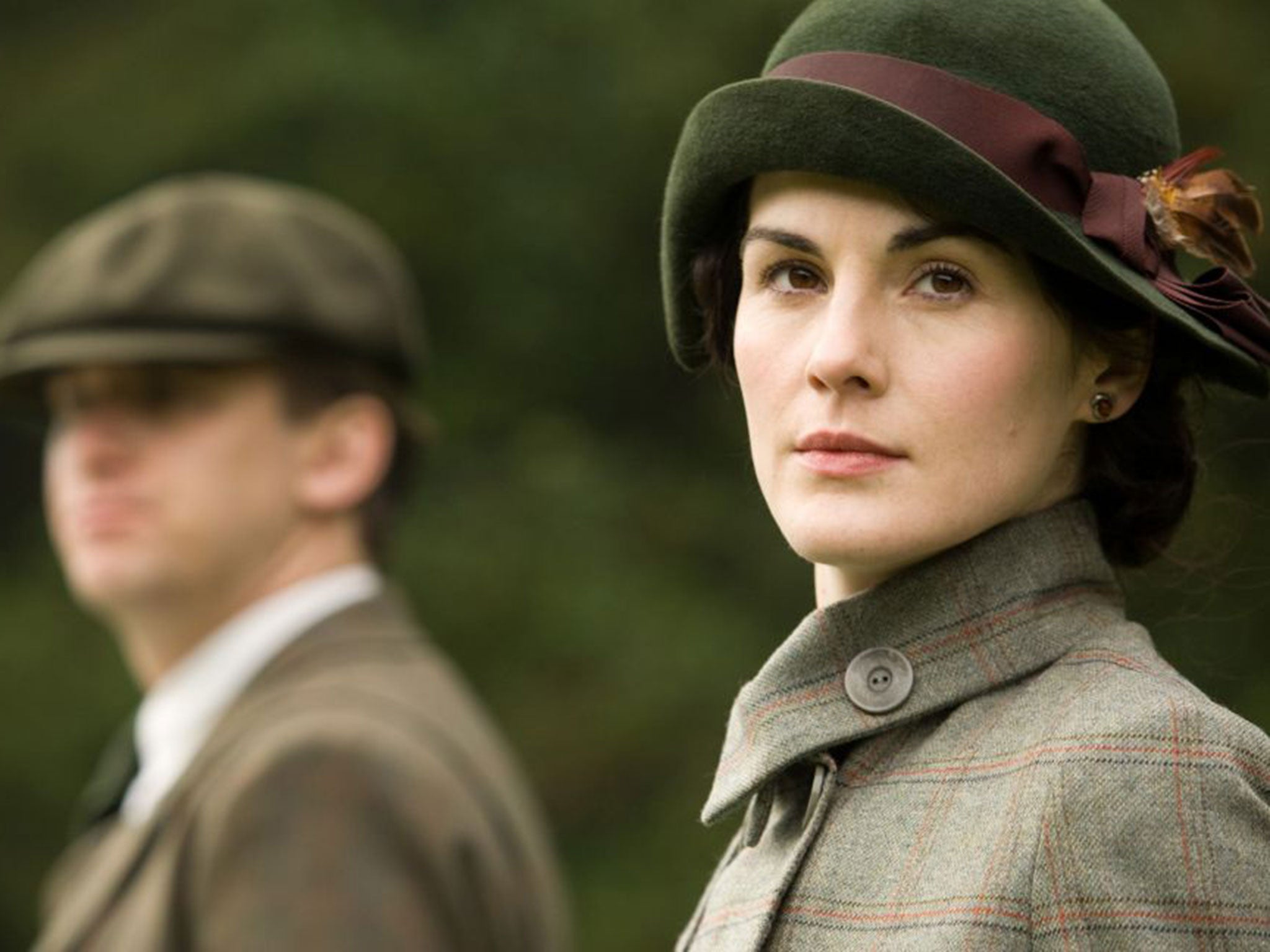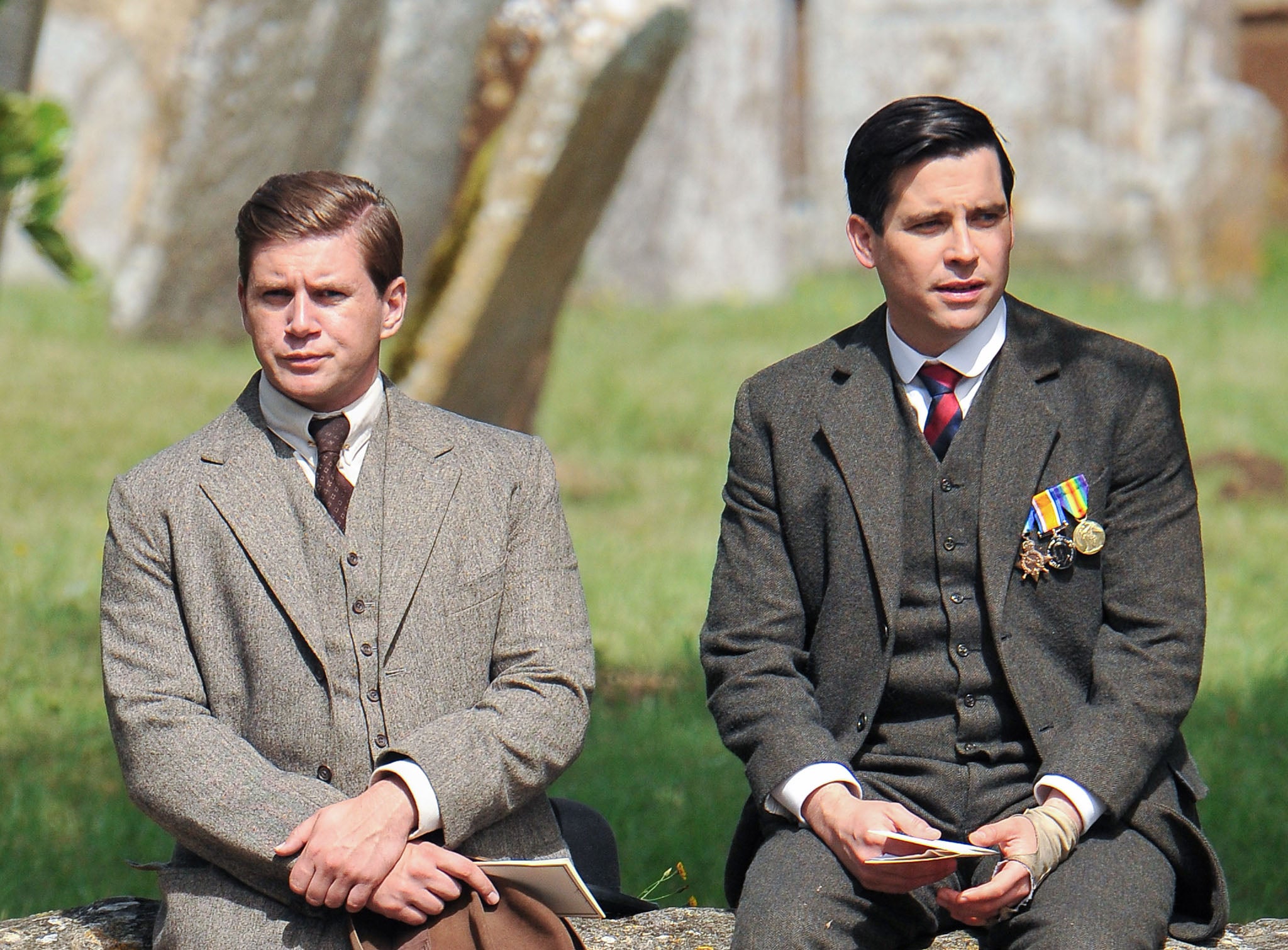Downton Abbey series 5: Hugh Bonneville and Michelle Dockery on sex before marriage and uppity servants
Will the show's stunning success last as Downton enters the swinging 1920s? Gerard Gilbert speaks to two of the drama's leading stars

The leader of the trade union movement, Frances O’Grady, recently warned that Britain was in danger of becoming a “Downton Abbey-style society” in which social mobility “has hit reverse”.
O’Grady probably hasn’t seen the opening episode of the latest series of ITV’s costume drama (only a few of journalists have, and we’ve been implored to keep schtum about storylines), but life is becoming a good less ossified as the fictional Yorkshire country seat reaches 1924.
Ramsay MacDonald is about to form the first (albeit short-lived) Labour government, parlour maids are pondering night courses in accountancy and Lady Mary Crawley (played with glacial hauteur by Michelle Dockery) is even considering test-driving one of her suitors, the persistent Viscount Gillingham. Is Lady Mary considering sex before marriage? Surely not.
“Well, yes, but it’s Downton, not Game of Thrones,” says Dockery, warning off viewers hoping for topless romps.
“She’s toying with the idea of having a relationship with a man that’s not in a marriage… she’s starting to ask questions, like, ‘why can’t I be absolutely sure about it before I decide to walk down the aisle with him?’. It’s an incredibly brave thing she’s doing because someone like her father would be outraged.”
“Robert’s conviction is that Ramsay MacDonald is going to smash down the gate and destroy Downton Abbey,” says Bonneville. “He’s not as bad as Carson [the butler played by Jim Carter], who really can’t stand change. Robert actually, if you think about it, is ready to accept change; but he doesn’t like violent change… he doesn’t like revolution.”
As it happened, The Village, which BBC1 broadcast in the weeks running up to Downton’s return (and if it was meant as a spoiler, it failed miserably), was also set in 1924, Peter Moffat’s drama looking at events primarily from the point of view of the lower orders. What does Bonneville think of historian Simon Schama’s remark that Downton Abbey favours the status quo – that it was a “servile soap opera” and a “silvered tureen of snobbery”?
Although he is willing to admit that Downton is a soap (“when you become bored of one storyline or one set of characters, some more will come along in about 32 seconds”), he denies that it is snobbish. “What’s interesting is that sort of comment is particularly British,” says Bonneville. “In America fans cross the road to tell you how much they love the show; in England they cross the road to tell you they don’t watch it.”

American fans go right to the top, as Bonneville and his screen wife, Elizabeth McGovern (who plays Lady Cora), discovered at a White House reception.

Watch Apple TV+ free for 7 days
New subscribers only. £8.99/mo. after free trial. Plan auto-renews until cancelled

Watch Apple TV+ free for 7 days
New subscribers only. £8.99/mo. after free trial. Plan auto-renews until cancelled
“Elizabeth had Hillary Clinton and I had John Kerry come over; he was complaining about how he was not sleeping very well, and he picked up this DVD his wife had been watching and he was still there at noon the next day because he got hooked on it. It’s quite surreal when leaders of state come and say they like your show.
“When I was introduced to the President I said: ‘I gather you’re a fan of Homeland. You are going to have to watch Downton Abbey eventually, sir, because your wife likes it. He said, ‘it’ll have to be on Air Force One because I’m quite busy’.” How did he know that Michelle Obama was a fan? “We were invited for Thanksgiving at the American ambassador’s house and he read out a letter from the First Lady saying how envious she was that he was hosting a dinner for us.”
Downton Abbey’s global success (it is screened between 230 and 240 territories, no one seems to know for sure) is truly phenomenal, and its stars are in the enviable position whereby they appear in the world’s most popular drama for six months of the year, and then have six months in which to exploit this exposure.

Bonneville will be spending his hiatus filming an as-yet unannounced TV mini-series, as well as “a little cameo on a thing called Gallivant – a slightly mad medieval Princess Bride-type romp for ABC in America – and cramming in a few episodes of a new series of W1A (the satire about life inside the BBC, in which Bonneville plays the hapless Head of Values, Ian Fletcher).”
Michelle Dockery meanwhile spent her last break from Downton in New York, filming the Liam Neeson action thriller Non-Stop (“great fun… very different”), and in New Orleans, co-starring with Ryan Reynolds in a sci-fi movie called Selfless.
“We all knew we were on to a good thing because Julian Fellowes was writing it and Maggie Smith was attached, but you never can predict,” she says in reply to my question about whether she had foreseen just what a phenomenon Downton Abbey would become. “Something just ignited… Maybe it was something about that particular time… I don’t know… it’s very hard to pinpoint.”
She says she tends to get recognised more in Los Angeles (“because it’s an industry town and everyone is always kind of looking”) than in London, where she lives.

“In London it’s very different… people are just going about their business, heads down, which is what I love about it.” The fact that she’s wearing modern dress and that her natural hair is shorter than in the show (where she wears a wig) also seems to put the public off the scent.
And on the subject of costume, Dockery says: “What I really love about this year is that Mary is really on trend with the fashion. You feel yourself wanting to steal the costume and wear it with jeans and heels. In fact I really see this series as the new Mary – she’s enjoying her single life, she knows that she has to move on now. She’s not crying so much.”
‘Downton Abbey’ returns to ITV on Sunday 21 September
Join our commenting forum
Join thought-provoking conversations, follow other Independent readers and see their replies
Comments